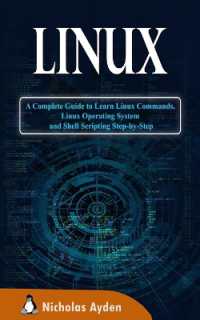- ホーム
- > 洋書
- > 英文書
- > Business / Economics
Full Description
This is a set of guidelines, with examples, for development project activities in developing countries, geared towards small community projects and NGDs, with an appropriate technology slant. The authors identify and discuss the roles of the "main movers" in development projects: first, the field workers - those implementing the action, looks at how they interact and suggests how this interaction may be improved. Secondly, the role of support organizations is examined, with particular reference to creative, financial and economic input, training and the organization of and efficient interface between the field experts and the aid organizations. Aid agencies are the third category examined, and their various roles are fully discussed. The book defends the idea that, whatever development action is proposed, it should begin with a proper in-depth identification of potentials and constraints that will influence it, even if this identification is subject to revision in the course of the action. The book then moves to programming - how to translate ideas into operational steps.Then comes the monitoring, which makes it possible to detect implementation anomalies, to correct action management and effect technical reorientations. The last stage is evaluation, which is a more complex analysis process while the action is in progress or already terminated. Its purpose is to make periodic judgements on the action and, if necessary, reorientate it.
Contents
Part 1 Development partnerslevel; the aid organization level; links between partners. Part 2 Action identification: markers - planned action, by what partners?, ascertaining practicable priority actions, to whose advantage?, direct beneficiaries, indirect beneficiaries, "exclusions", partners' involvement in identification, viability, technical viability, organization viability, social and cultural viability; approaches and tools - ascertaining what actions are practicable?, what information is required?, collecting information, matrix for the collection of information, inventory of existing studies and studies to be conducted, direct observation, interviews and meetings, surveys, processing the information, classifying the information, analyzing the information, accounting tools, reporting back, storing information, conclusion. Part 3 Action programming: markers - defining actions for programming, organizing the three action levels, fostering a good climate for the negotiations, programming in a flexible framework, relating programming to monitoring and evaluation, planning condition for the withdrawal of aid; approaches and tools - programme content, actions selected by the population, the support programme, the aid programme, some specific tools, action fact-sheet, programme in support of action implementation, draft budget, funding plan and cash-flow plan, training plan. Part 4 Action monitoring: markers - monitoring is distinct from evaluation, the purpose of monitoring, partners in monitoring, characteristics of a monitoring procedure, involvement of community-level partners in the monitoring system; approaches and tools - monitoring action implementation, indicator control panel system, processing and analyzing indicators, indicators for monitoring the support programme, operation monitoring fact-sheets, accounting and management documents, account auditing, reports. Part 5 Action evaluation: markers - evaluation calls for continual questioning and constructive criticism, the use of evaluation, evaluation partners, evaluation should be negotiated among the various partners, putting evaluation results to use; approaches and tools - evaluation criteria, evaluation stages, collecting information, processing information, using the information.





